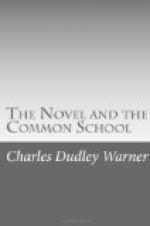Now, what is the relation of our intellectual development to this physical improvement? It will be said that the general intelligence is raised, that the habit of reading is much more widespread, and that the increase of books, periodicals, and newspapers shows a greater mental activity than existed formerly. It will also be said that the opportunity for education was never before so nearly universal. If it is not yet true everywhere that all children must go to school, it is true that all may go to school free of cost. Without doubt, also, great advance has been made in American scholarship, in specialized learning and investigation; that is to say, the proportion of scholars of the first rank in literature and in science is much larger to the population than a generation ago.
But what is the relation of our general intellectual life to popular education? Or, in other words, what effect is popular education having upon the general intellectual habit and taste? There are two ways of testing this. One is by observing whether the mass of minds is better trained and disciplined than formerly, less liable to delusions, better able to detect fallacies, more logical, and less likely to be led away by novelties in speculation, or by theories that are unsupported by historic evidence or that are contradicted by a knowledge of human nature. If we were tempted to pursue this test, we should be forced to note the seeming anomaly of a scientific age peculiarly credulous; the ease with which any charlatan finds followers; the common readiness to fall in with any theory of progress which appeals to the sympathies, and to accept the wildest notions of social reorganization. We should be obliged to note also, among scientific men themselves, a disposition to come to conclusions on inadequate evidence—a disposition usually due to one-sided education which lacks metaphysical training and the philosophic habit. Multitudes of fairly intelligent people are afloat without any base-line of thought to which they can refer new suggestions; just as many politicians are floundering about for want of an apprehension of the Constitution of the United States and of the historic development of society. An honest acceptance of the law of gravitation would banish many popular delusions; a comprehension that something cannot be made out of nothing would dispose of others; and the application of the ordinary principles of evidence, such as men require to establish a title to property, would end most of the remaining. How far is our popular education, which we have now enjoyed for two full generations, responsible for this state of mind? If it has not encouraged it, has it done much to correct it?
The other test of popular education is in the kind of reading sought and enjoyed by the majority of the American people. As the greater part of this reading is admitted to be fiction, we have before us the relation of the novel to the common school. As the common school is our universal method of education, and the novels most in demand are those least worthy to be read, we may consider this subject in two aspects: the encouragement, by neglect or by teaching, of the taste that demands this kind of fiction, and the tendency of the novel to become what this taste demands.




